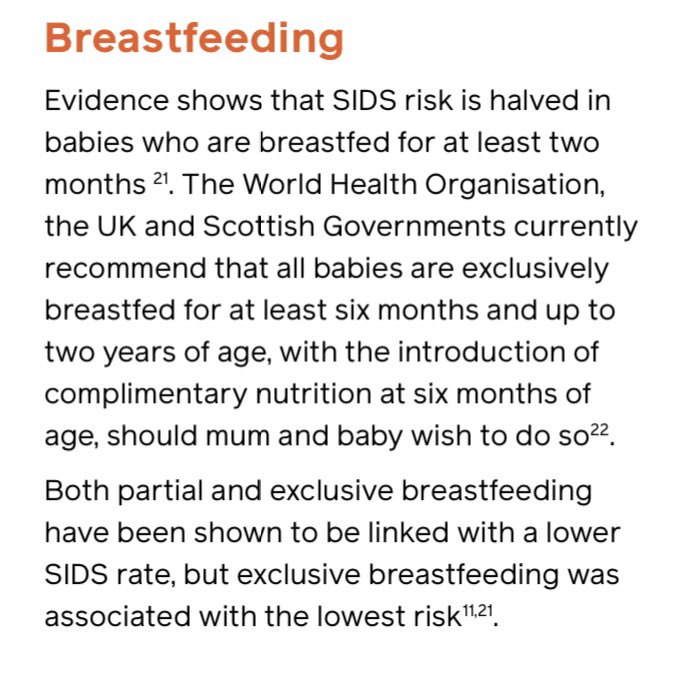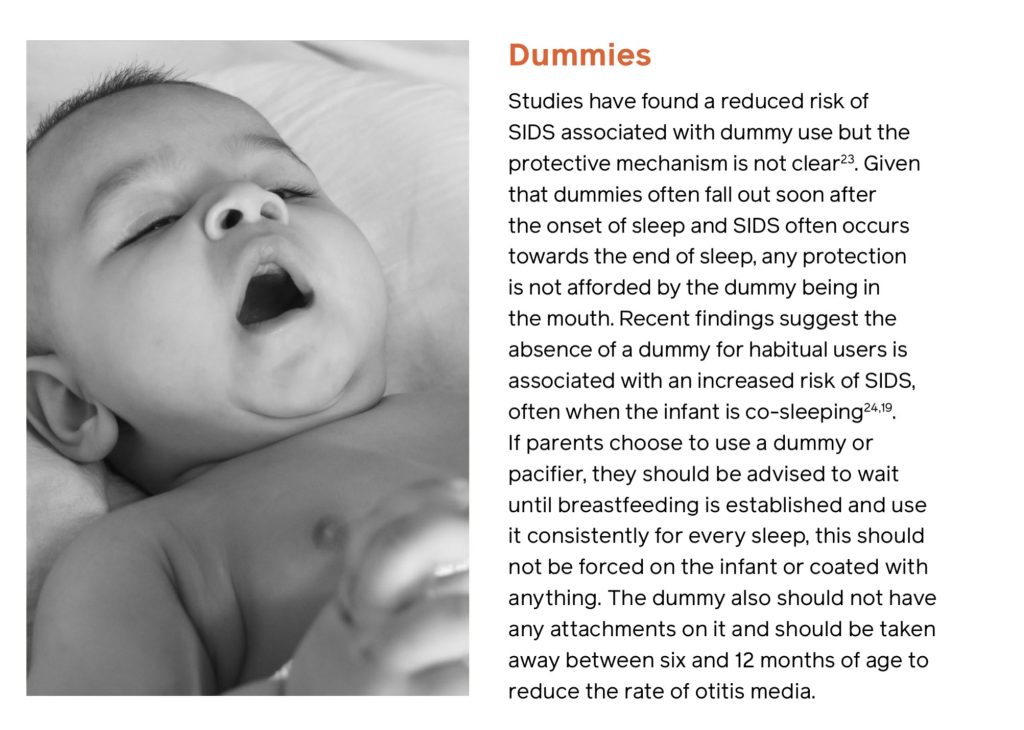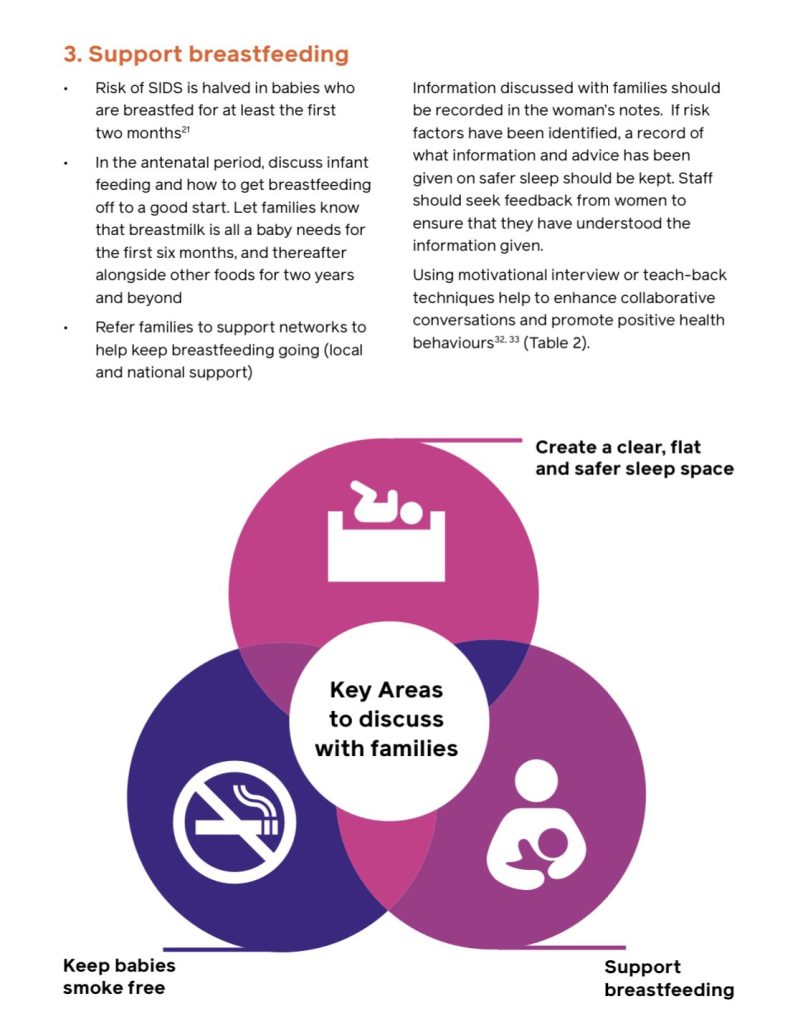Last week, the Royal College of Midwives (RCM) was accused of two crimes, when it published new guidance on safer sleeping.
Crime 1: Making no mention of women or mothers in these guidelines. Is RCM guilty of this crime? No. The guidance mentions the word ‘women’ or ‘woman’ four times and the word ‘mother’ or ‘mothers’ twice. Despite this, RCM confessed to the crime, apologised profusely, took the guidance down and are revising the language used.
Crime 2: They are accused, by us, of misrepresenting the scientific evidence, with the goal of coercing women into breastfeeding and discouraging them from using dummies. This appears to be more about pushing breastfeeding than preventing babies dying from SIDS.
RCM swiftly responded to the allegation that it did not mention women or mothers in the guidance, seemingly without even realising that it had done so on six occasions. However, RCM has not yet answered parents’ concerns that it is misrepresenting evidence with the goal of promoting breastfeeding, not preventing SIDS.
What follows is an edited version of the Twitter thread in which we raised our concerns, shortly before RCM withdrew the new guidance.
More nonsensical guidance has been published by the RCM:

RCM, we are not confused. You are giving contradictory advice. Bedsharing is a risk – a risk that can be mitigated to some extent. However, some of you think bedsharing promotes breastfeeding, so you tell us to bedshare, then tell us not to bedshare.

Wrong. The study cited does not provide clear evidence that breastfeeding reduces the risk of SIDS. It found an associated reduction in SIDS risk for families who breastfed. This is not clear evidence that breastfeeding causes a reduction in SIDS risk.

The association between dummy use and reduction in SIDS risk is stronger than the association between breastfeeding reduction in SIDS risk. It is correct to point out that the mechanism is unclear and the association may not be causal, however, unlike breastfeeding, which is highly associated with socioeconomic advantage, use of dummies is not so clearly patterned by socio-demographics. Therefore, we could plausibly argue that dummy use is a more compelling potential causal factor in reducing SIDS risk than breastfeeding. And unlike breastfeeding, dummy use is cheap, accessible and convenient for the vast majority of families. If it turns out that dummies reduce SIDS risk, then recommending dummies would be a winning public health strategy to reduce SIDS!
Moreover there is no evidence at all that using a dummy interferes with the establishment of breastfeeding. Indeed results from randomised trials suggest that use of dummies/pacifiers makes no difference at all to long term breastfeeding rates.
So, RCM have advised parents to avoid something that might reduce SIDS risk because of their pathological fear of ‘artificial teats’ and their impact on breastfeeding, which has zero basis in the scientific evidence because they want to get more women to breastfeed. And more to the point, many babies find sucking a dummy soothing and that helps settle them more easily. That’s good for everyone. It is our decision to use or not use a dummy. You have no business trying to scare us out of using one early on! Butt out of our family life!
And look at the confusion here:

1. As we explained, there isn’t good evidence to clearly say breastfeeding is what reduces the risk of SIDs in babies who are breastfed.
2. In the antenatal period: what can be said? There’s zero evidence about how to prevent or resolve common breastfeeding problems, so we don’t know how to get it off to a ‘good start’.
3. It is not true to say that breastmilk is all a baby needs for the first six months. Breastfeeding insufficiency is common and the evidence is there for anyone who cares to look, which would not, apparently, be the Royal College of Midwives, the Royal College of Obstetricians and Gynaecologists or the Royal College of Paediatrics and Child Health. In the absence of healthcare providers taking responsibility for understanding the evidence and ensuring babies are safely fed, here is a comprehensive review by Dr Vera Wilde, a mother whose baby suffered from insufficient breastmilk intake.
4. It is recommended to refer us to ‘networks’ who support breastfeeding. These networks cannot provide clinical care and are basically run by breastfeeding enthusiasts whose primary qualification is having breastfeed their own baby. Essentially, this is simply peer pressure to keep breastfeeding.
And why the obsession about breastfeeding here anyway? There’s no evidence that attempts to increase breastfeeding rates have had any impact at all on SIDS rates. Once again, RCM have lost sight of the primary agenda here and turned SIDS prevention into breastfeeding promotion!
And now apparently we are to be subject to ‘motivational interviewing’ and ‘teach-back’ techniques to enhance ‘collaboration’ and ‘promote positive health behaviours’.

But here’s the thing, RCM and everyone else involved here, when you decided you knew best and that breastfeeding is good for us, you sacrificed your ability to form collaborative relationships with patients that respect our needs and wishes, which may or may not include breastfeeding. Breastfeeding promotion is not compatible with collaborative, patient-centred care. You have decided that breastfeeding is always good and that you want to use motivational techniques to ‘support’ (coerce) us into doing more of it. But this ignores families who experience adverse effects of breastfeeding and for whom it does more harm than good!
Meeting a baby’s nutritional needs with formula is a health-promoting behaviour. Sharing feeds so that a mother can get adequate rest and sleep and feels less burdened by the demands of early baby care is a health-promoting behaviour. Each family needs to figure out for themselves what their needs and priorities are and how the infant feeding methods available to them are going to facilitate those.
You need to butt out of our family life, and when it comes to preventing SIDS, focus on SIDS prevention strategies that have clear evidence behind them, that are accessible and easy for families and stop confusing everything by making SIDS prevention about breastfeeding promotion. And please: Read the evidence before advising us!

